24th August, Kigali , Rwanda. The Ministry of Environment, City of Kigali, Ministry of Infrastructure and the Global Green Growth Institute launched the “Waste to Resources” project in the City of Kigali in Rwanda. The project is led by the Ministry of Environment of the Government of Rwanda and funded by the Ministry of Environment, Climate and Sustainable Development of the Government of the Grand Duchy of Luxembourg.
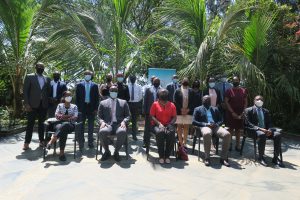
The project aims to valorize organic and plastic waste; increase collection of electronic waste; and increase community awareness, build capacity, and improve the policy and regulatory environment for circular economy initiatives in the waste sector.
The event provide a platform for engagement between policymakers, the private sector, entrepreneurs, and community representatives and will serve as the official launch of the project activities. Invited participants included key technical focal points on solid waste management from the principle Ministries: Ministry of Environment and Ministry of Infrastructure as well as the Private Sector Federation (PSF).
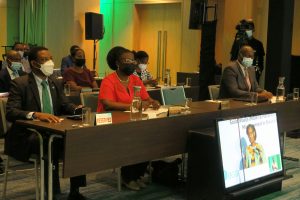
The hybrid/virtual meeting was well attended with more than 40 participants online following the discussion and media briefing. Representatives from the Ministry of the Environment, Climate and Sustainable Development, Government of the Grand Duchy of Luxembourg (via videoconference) ;Ministry of Environment, Government of Rwanda ; Ministry of ICT and Innovation in Rwanda ; Ministry of Infrastructure (MININFRA) ; City of Kigali ; Global Green Growth Institute (GGGI) ; Water and Sanitation Corporation Ltd | Rwanda (WASAC) ; EnviroServe ; Private Sector and Academia.
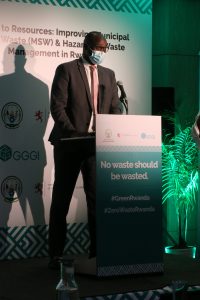
Mayor of the City of Kigali, Pudence Rubingisa
In his remarks, the City of Kigali Mayor Pudence Rubingisa said “the City of Kigali welcomes this project given that Kigali is targeting to be a green city and this project which promotes integrated sustainable waste management approaches and circular economy business models to increase the capacity of the current waste management system is booster to this initiative. The City of Kigali is fully committed in exploring innovative solutions needed to utilize the circular economy approach towards waste management in Kigali and to recuperate recyclable materials, harness energy and also have a sustainable sanitary landfill. The City of Kigali has made strides in as far as waste collection and transfer is concerned but we still have a long way to go with management of waste at the landfill, transformation of waste to energy or other resources and management of hazardous waste.”
The City of Kigali has deployed strategies aimed at increasing collection and measures to mitigate the most urgent risks and concerns regarding the operation of the Nduba landfill. However, additional measures are needed to increase the sustainability of the site as well as to integrate circular economy approaches to several of the waste streams entering the site. The interventions introduced as part of the project outcomes will have the potential for replication at waste management and collection sites throughout the country.
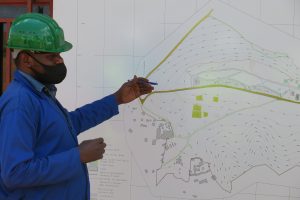
Assistant Director-General and Head of the Investment and Policy Solutions Division (IPSD)
Global Green Growth Institute (GGGI) , Dr. Kyung Nam Shin said in his opening remarks “this project comes at a time when the scientific community has provided irrefutable evidence of the scale of the impact of human activity on the environment. The Sixth Assessment Report of the IPCC has provided in no uncertain terms the clearest issuance of the need for urgent and aggressive climate action to avoid calamitous consequences. Stronger action and collaboration are necessary to avoid the most disastrous effects of climate change. Cities are increasingly faced with mounting challenges that result from business-as-usual practices in waste management. GGGI has increasingly become acknowledged as a trusted knowledge sharing and implementation partner for circular economy approaches to waste management. As a result, GGGI has established projects in Asia, Latin America, and Africa that deliver benefits to municipalities by using a circular economy approach”
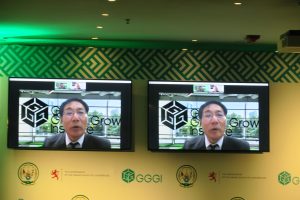
Assistant Director-General and Head of Investment & Policy Solutions Division, Kyung Nam Shin, Global Green Growth Institute (GGGI)
GGGI activities span from pilot projects to large-scale, municipal-level interventions designed to introduce transformative applications of technology and innovation to valorize waste streams. Our work in Peru is developing a 2M USD investment project for composting and organic waste recovery. Our work in Morocco aims to generate ITMOs to mobilize resources for an organic waste-to-energy project. We are implementing large-scale, BioCNG programmes in Indonesia, India, and Thailand. These projects have resulted in increased revenues, clean energy production, and the mobilization of green investment to integrate circularity into the waste sector.
During her remarks the Honourable Minister Carole Dieschbourg of the Ministry of the Environment, Climate and Sustainable Development of the Grand Duchy of Luxembourg, was very pleased that project has finally commenced. She said that todays launch marks the 5th collaboration with GGGI, the 2nd in Waste and solid management, and the first bilateral with Rwanda. She reminded the participants that the recent IPCC special report on the impacts of global warming of 1.5 °C indicate that if we dont act now, we shall reach point of no return , and for this reason urgent action is needed to steer away from this scenario. Projects that adapt to climate change are more critical than ever ,public and private actors are to mobilize funds and is important for government to take responsibility to create good regulatory frameworks and enabling environment for private sector to fulfil its role in sustainable way. We need every sector to make extra ordinary efforts for our world to be clean and safe, and the waste sector has an important role to play in fight against climate crisis, by learning to reduce, reuse, recycle. ”
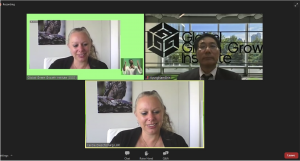
Honorable Minister Carole Dieschbourg, Ministry of the Environment, Climate and Sustainable Development, Government of the Grand Duchy of Luxembourg
In her remarks Honourable Minister Jeanne d’Arc Mujawamariya, Ministry of Environment (MoE), Government of Rwanda , applauded all the partners for having achieved this critical milestone to support Rwandas green growth ambitions the population growth and rapid urbanization of Rwanda’s cities both pose significant challenges to sustainable development and green growth. The City of Kigali has undergone a dramatic period of expansion and economic development. Currently, the City of Kigali faces multiple priorities and demands to meet rising demands for sustainable services. Solid waste management is recognized as a critical need area with impacts that overlap public health, environmental protection, and employment. Waste entering landfill sites in the City of Kigali has increased from 141.38 tons per year in 2006 to 495.76 tons in 2015. Mitigation measures in the waste sector constitute 14% of the potential for GHG emissions reduction. Of the 0.66MtCO2e of estimated mitigation potential from waste, 54% is from landfill gas utilization, 34% from waste-to-energy, and 9% from aerobic composting. The National Environment and Climate Change Policy identified inadequate waste treatment as well as the increase of electronic waste as one of the key issues and challenges in environmental management. Solid waste management is a critical component required to move towards a green economy. Innovative solutions are needed to utilize the circular economy approach towards waste management in Rwanda and to recuperate recyclable materials, harness energy and reduce landfill sites. The business model of waste management has proven effective in treating waste as a valuable resource.
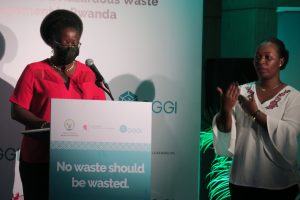
Honorable Minister Jeanne d’Arc Mujawamariya, Ministry of Environment (MoE), Government of Rwanda
In light of these challenges the Ministry of Environment of the Government of Rwanda initiated a Memorandum of Understanding (MoU) with the Ministry of the Environment, Climate and Sustainable Development of the Government of the Grand Duchy of Luxembourg to strengthen cooperation and technology transfer between the two countries and ultimately to embark on the project Waste to Resources: Improving Municipal Solid Waste (MSW) and Hazardous Waste Management in Rwanda.
The project aims to adopt integrated sustainable waste management approaches and circular economy business models to increase the capacity of the current waste management system in the City of Kigali. The project aims to incorporate technical assistance and technology transfer to facilitate specialized waste treatment and recycling at the Nduba landfill”
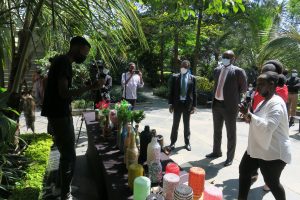
Exhibitors Deaf Art Gallery and Angaza
By strengthening the capacity of key actors and incorporating technological approaches to sustainable waste management, the project aims:
1) to reduce the untreated waste collected at the landfill site,
2) create revenue-generating business models from existing waste streams to create green jobs,
3) increase access to sustainable services for residents in the City of Kigali, and
4) reduce GHG emissions from the waste sector.
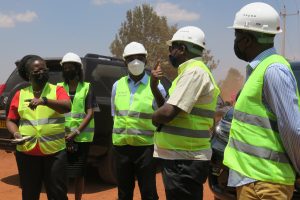
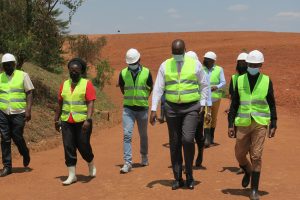
Site Visit: Nduba Landfill
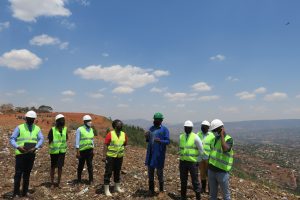
The project launch was followed by a the first project steering committee meeting and site visit to Nduba landfill. The project will be implemented over three years and aims to mobilize 20M EUR in green investments to modernize and integrate sustainable waste management practices in Rwanda.
The Board/Steering Committee will serve as a platform for leadership and decision-making to engage, advise and guide the project implementation process and deliverables ;
ii. Facilitate coordination by linking the different government departments and agencies involved on the project and other related work on sustainable waste management.